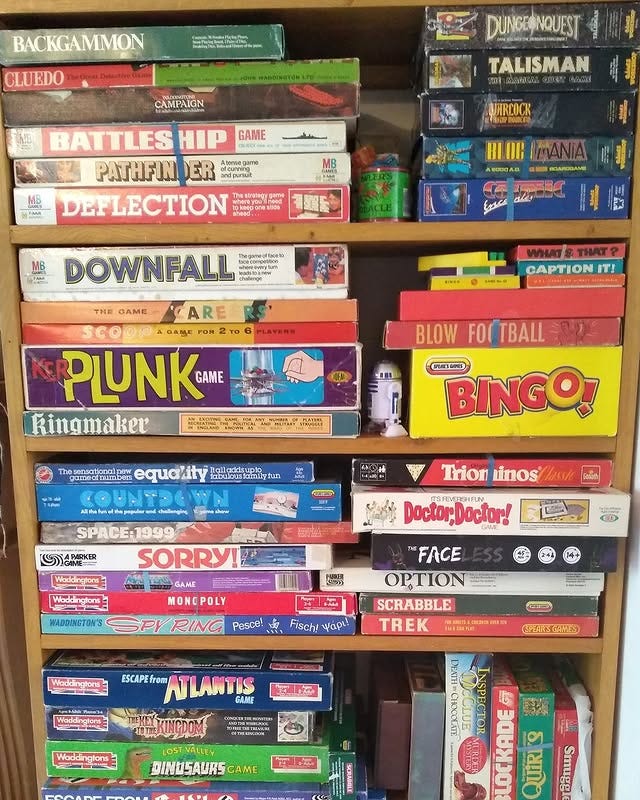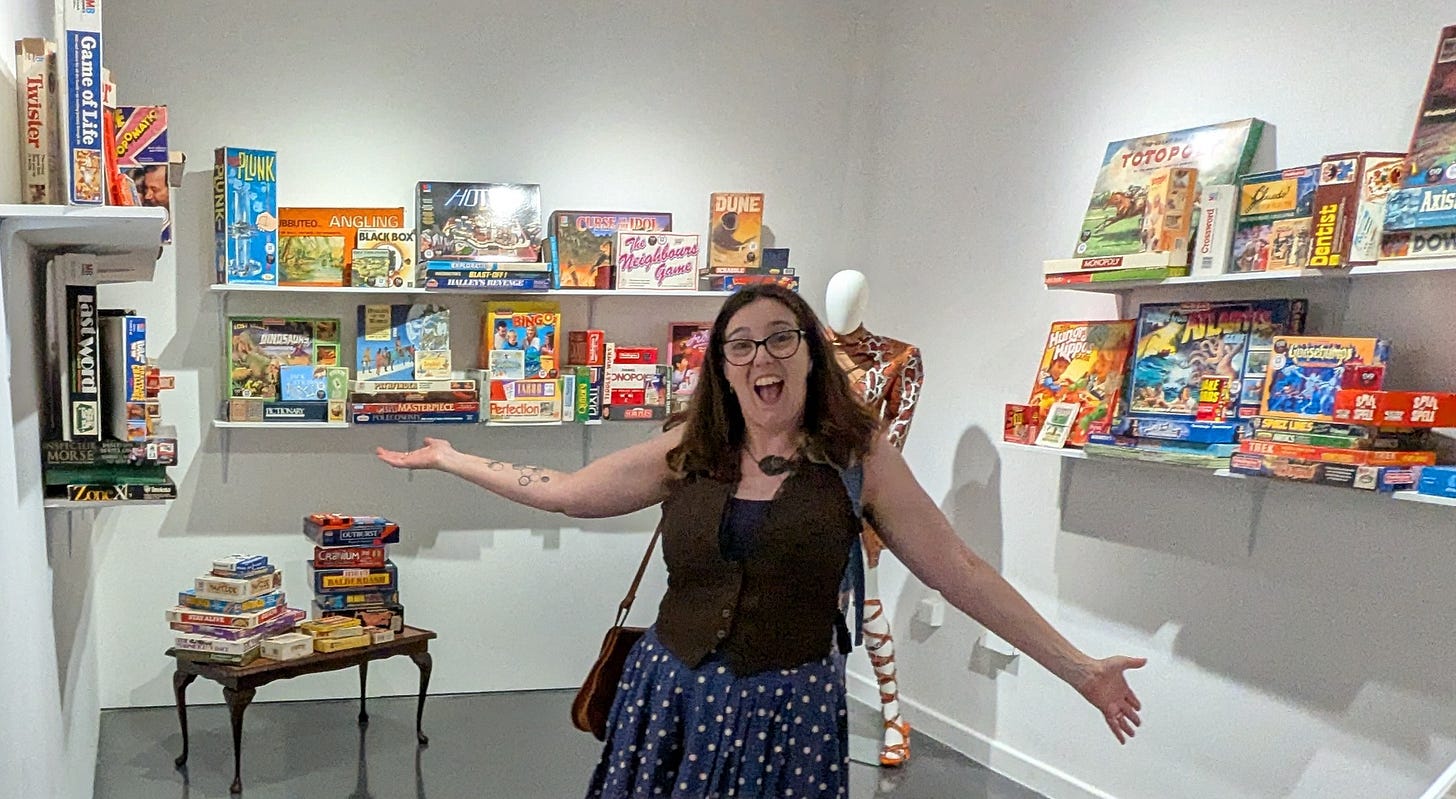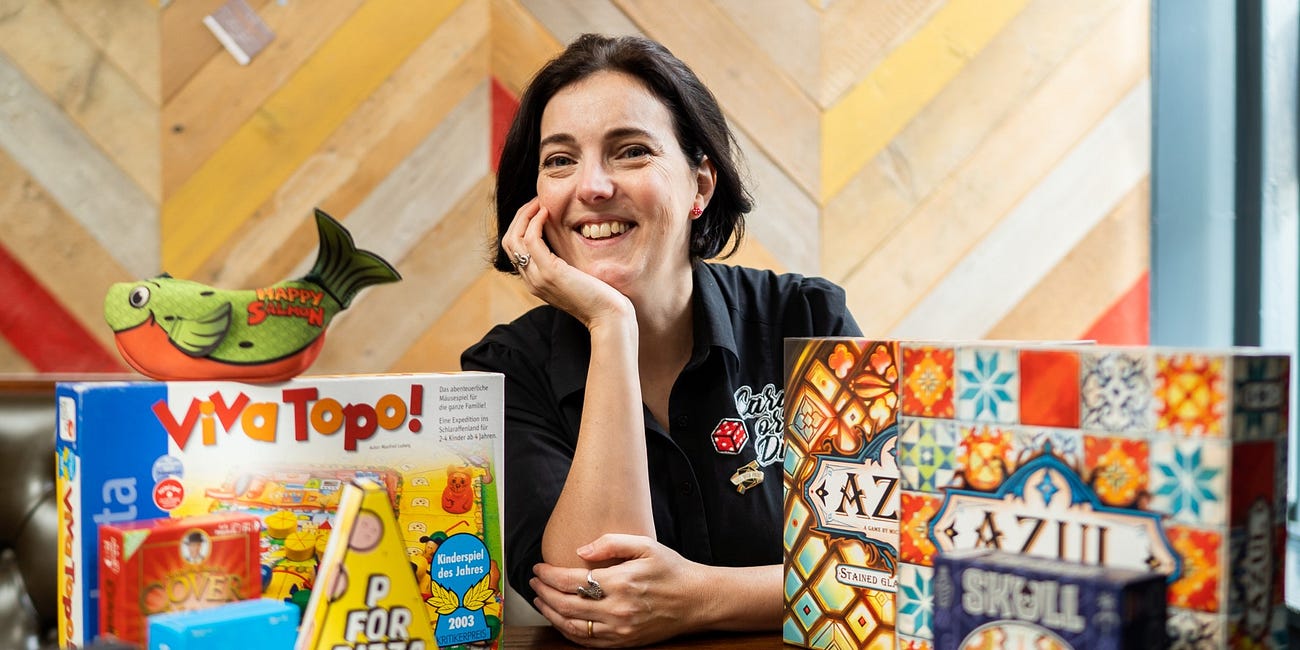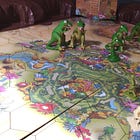Ann Jones: vintage games exhibition offers 'direct route back to early memories'
The Cards or Die founder is displaying her retro board games collection as part of the Come as you Really Are exhibition in Barnsley
There’s a joy in collecting – finding your niche and revelling in it. And what more celebratory way of sharing that enthusiasm than by putting it on display as part of an art exhibition.
That’s what Ann Jones has done. The founder of Cards or Die – a Leeds-based company that provides tabletop games for training sessions and social events, including weddings – is displaying 155 vintage board games from the 1940s up to the 1990s from her own collection as part of the Come as you Really Are exhibition in Barnsley, in Yorkshire.
The display and exhibition are part of a UK-wide project led by artist and curator Hetain Patel and arts organisation Artangel, which features thousands of objects that are created, modified or collected by the nation’s hobbyists, to be displayed across 13 galleries in the UK.
Of course, Yorkshire, and Leeds in particular has a rich history in board games, having been the home of Monopoly and Cluedo publisher Waddingtons – a point that Ann is keen to share in the exhibition.
So, how did Ann get involved? What earlier innovations should be brought back into the modern hobby? What reaction has the vintage collection had with visitors? We had a chat to find out.
What is the Come as you Really Are exhibition and how did you get
involved in it?
AJ: The Come as you Really Are exhibition is a celebration of hobbies.
It was created by Hetain Patel – he worked with ArtAngel to put the exhibition on. It is touring around Britain and showcases local people's hobbies as well as Patel's transformer made from a Ford Fiesta and car covered in a lovingly hand-tufted exact replica of his grandparent's carpet.
The one in Barnsley has drag couture, a massive collection of Barnsley football shirts and memorabilia, crochet, paintings, a cabinet full of really cool cocktail sticks, felted creatures, taxidermy birds, puppets, gig tickets, quilting… and much, much more.
There is a glorious abundance of things of all sizes and colours - it truly feels celebratory.
You’ve got games from the 1940s to 1990s showcased at the Barnsley Civic centre. Talk us through some of your games on display. What
curios and oddities feature?
AJ: One of my recent additions which I am obsessed with but too afraid to play is my Ouija Board. It's an original William Fuld board (as seen in The Exorcist - in my opinion one of the finest horror films ever made). Horror is my favourite genre of film and so here, two of my interests have collided.
The other thing that is special to me about this one is that although it is a Parker Bros product, this version was made by Waddingtons right here in Leeds. I've got a large collection of Waddingtons games as they are an important part of Leeds' social history.
I've got a 1940s copy of Lexicon. It has been made to look like a small dictionary and it is just exquisite. Word games are one of my favourite types of game and Lexicon is brilliant. It also features a rule book, which has been sewn on the spine to bind it. You can feel how old it is from the paper. I love when I find old games that have clearly been well looked after and cherished.
The Find the Fault games are images where you have to find what is wrong with the picture. The challenge is that because they are from the 40s and 50s what was considered general knowledge then - like which side particular medals go on a soldier's uniform - is not so common now.
Why have you focused on this era in particular for the exhibition? Is there an element of pushback towards the cult of the new?
AJ: Not exactly. There's nothing wrong with new games but I do think it's nice to slow down sometimes, but my main reasoning is to do with nostalgia.
Games offer a direct route back to early memories of playing games with family, of rainy caravan holidays, of days-long games of Monopoly on a bank holiday weekend.
At events, I always have a small selection of vintage games. Notably missing from the exhibition is Hearts from 1914, a ‘thrilling’ dice game. (It’s not actually thrilling but it is adorable and popular at weddings so it’s stayed home with me!)
People often pick them up and look at the pictures. Sometimes they get them out and play, but other times they’ll tell me stories or reminisce with friends – vividly recollecting tales from a simpler time.
The total board games collection is over 600 but the vintage games hold a special place in my heart. On a very practical level it would have been difficult to work out which games to exhibit as I need them for events and it is the modern games that get played the most at events. So my first consideration was practical but then when I thought how little the vintage games get played it saddened me – I absolutely love
the whole experience of playing the vintage games.
To say they are a mixed bag is generous but they are never boring to me. Without the innovation of the vintage games, of course board games wouldn’t be where they are today. Tracking that journey is fascinating.
Vintage games from this era get a lot of stick nowadays for being seen as filled with basic roll and movers. What surprising game mechanics and features have you found of the games in the collection? What are some of the good qualities in these games that have been lost in time and would be worth bringing back?
AJ: There are not many features which I would want to bring back – apart from rules in lids. Rules in lids was genius: no lost rule books, pressure to keep your rules succinct – either that or have it in a massive box, I suppose.
Most things that worked well were kept and adapted. People still enjoy the jeopardy of a dice roll. Some of the 'exciting' mechanics meant that the game got a little lost. For instance, in Thunder Road the board is kind of a jigsaw in two strips and when you get to the end of one length you place the first board in front again. So, it creates an endless loop. Unfortunately the game itself is like an endless loop. When we played, we didn't seem to be able to get to the end.
Other features are great but they are already in perfectly playable games so there's no need to replicate or try to modernise them. The magnetic treasure chests in Sunken Treasure are fun. You pick them up as you move around the board and of course you are trying to steal from others or sabotage their plans with a well-placed octopus or a well-timed storm.
The randomised telephone in Scoop is a joy. You are trying to create a full newspaper spread but for each story you collect, you need to ring the editor, which can result in bonuses or fines for plagiarism. It's a cut-throat world.
The Magnificent Race has a spinner and when you race, you put balls in it. You can collect tickets for extra entries as you move around the board thereby putting more balls in the spinner. You spin it and it generates a winner, which is then removed so that you can see who comes second and reward them appropriately. There is also a non-player character – Desperate Dan, who always has one ball in the race. It adds
to the game because as well as racing each other, you are all united in not wanting Dan to win!
‘I always encourage solo players to come to events as it's important to me that I use the games to bring people together’ – Ann Jones
Why do you game? What makes it your kind of fun?
AJ: There are lots of reasons I enjoyed games. I think as a child it was seen as a useful activity - one that my older siblings and sometimes even my parents would join in with. I liked the sociability of that and now I like getting together with my family and playing games. There's something really present about it, it's a lovely, fun way to spend time together.
I also like the different levels of challenge. Depending on my mood or brain power, I can play something that really immerses and challenges me to plan, strategise and concentrate or sometimes I can just play something tactile or easy that requires no plan of action.
Since I got my autism diagnosis, I'm realising that for me it's also a good structure. I don't have to worry so much about small talk and I find it easy to play with most people even if I don't know them so well. I don't feel so exposed or like I'm having to concentrate on the interaction as much as in day-to-day communication.
What kind of response has there been from visitors? Is there a lot of nostalgia, or are most people seeing these games for the first time?
AJ: I was there on launch night and there was a lot of nostalgia – people recognising games from their childhood or games they played with their children, there were also the games that we always wanted as kids but never had.
There are always some in the collection that people don't know or remember but I think on the whole people have focused on the ones that they have fond memories of.
How much interactivity is there at this exhibition?
AJ: There isn't interactivity in the usual sense.
Objects are not to be touched or moved. But, because many of the items are so personal there is a sense that you are interacting with the collector or the maker. They are sharing something with you that perhaps they don't usually share or perhaps in the past they have been regarded negatively because of their hobby.
Patel, working with Barnsley Civic, has created a real sense of wonder and awe at these collections. They are there to be admired and that feels personal.
Are there any grail games that you really wanted to exhibit but have been rare or difficult to find?
AJ: The Ouija board was one I had waited a long time for because I specifically wanted a Waddingtons one.
At the moment I can't think of anything, but people often recommend things to me and then I'll keep an eye out for them.
You provide games to play at weddings. What’s the service you provide for this and what kind of games really work in this setting?
AJ: Just like at all my events, I go along to the wedding with a massive selection of games and then I'm there to teach and recommend them to people and to encourage people to play together.
It tends towards party games that play large numbers, are quick to pick up and quite silly or light-hearted. Pretty much anything that Big Potato do is a guaranteed hit.
However, it does vary. Somehow, Carcassonne seems to always get played at weddings. I also have a spreadsheet with all the games on so that people can be as involved as they want.
Some people choose every game they want, others leave it entirely up to me and a lot of people choose some and then I top it up using what they've chosen as a guide.
Sharing your games, whether via Cards or Die, weddings and now the exhibition, is front and centre of everything you do around the hobby. What compels you in this approach?
AJ: I think it's like I said before about the ease of connection around games. I have always wanted to do something about social isolation and I believe in my own small way I am making a contribution.
I always encourage solo players to come to events as it's important to me that I use the games to bring people together. It's also allowing people to connect to people who they already know - having that time off-screen absorbed in something together, not worrying about the world for a bit. It gives people a bit of a break, too.
When I started doing corporate bookings, I just saw it as a way to subsidise other lower-paid bookings that I believed were having more social impact. But, when I actually started doing the bookings in workplaces, I realised it was just as valuable.
Watching people trudge in with the weight of work on their shoulders and then forget all about it and laugh and joke with colleagues is amazing. When they leave the session they seem lighter, happier. Even if they only have that for a short time at least they've had that proper break from work.
What’s your advice to anyone who wants to create an exhibition out of their own collection? What steps should people take to protect their collection while ensuring it can be enjoyed by others?
AJ: This is a tricky one as the Civic centre where the games are displayed has responsibility for them. As with any exhibition, people are not allowed to touch exhibits and there are staff always present in the space.
Come As You Really Are is at Barnsley Civic centre until August 8. It’s still accepting submissions - apply at thehobbycave.org.uk. For more information on Ann’s work, visit cardsordie.com
Ann Jones: 'Rules should never allow for opinion'
The Cards or Die founder on the need for good copy-editing in tabletop games.
Family game reviews (from the perspective of a bewildered father and over-excited child)
Share The Generations Games? Ah, go on…
if you made it this far, you’re probably keen on family tabletop games, and games with a strong social theme. Forwarding to a like-minded friend can make a huge difference to the future of The Generations Games and our hopes to expand our output.










